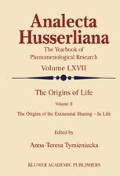Abstract
In a foreword to Jean-Paul Sartre’s Essays in Existentialism, Wade Baskin states that it has been alleged that existential phenomenology (he calls it existentialism) is not a“disciplined philosophical system,”1 much less is it the title of a homogeneous school or coherent system of philosophy, but rather the“label for revolts, in diverse guises, against traditional philosophy.”2 So too is postmodernism. As existential phenomenology would appear to be a cacophony of doctrines with commodious room for a bizarre, anarchic individualism and a life-strategy of activity, responsibility and selfhood, so does postmodernism seem to be a Potpourri of ideas ranging from the advocacy of facile eclecticism to the internalizing of a non-impositional and non-dogmatic style of thinking, talking and experiencing.
Access this chapter
Tax calculation will be finalised at checkout
Purchases are for personal use only
Preview
Unable to display preview. Download preview PDF.
Notes
Cf. J.-P. Sartre, Essays in Existentialism (Secaucus, New Jersey: The Citadel Press, 1977), p. v.
Ibid., p. v.
See Hans Bertens, The Idea of the Postmodern: A History (London and New York: Routledge, 1995), p. 20.
Ibid., p. 3.
Ibid., p. 3.
Ibid., p. 3.
Ibid., p. 21.
Ibid., p. 21.
Ibid., p. 21.
See Charles Olson, Human Universe and Other Essays, ed. Donald Allen (New York: Grove Press, 1967), p. 5.
Ibid., p. 59.
Thomas Hutchinson (ed.), Wordsworth: Poetical Works, rev. Ernest De Selincourt (London: Oxford University Press, 1971 edition), p. 735.
See Karl Löwith, Heidegger Denker in Dürftiger Zeit Frankfurt a.M.: S. Fischer Verlag, 1953, pp. 84–85; quoted by V. Vycinas in his Earth and Gods (The Hague: Nijhoff, 1961), p. 77.
See Wallace Martin,“Postmodernism: Ultima Thule or Seim Anew?,” Bucknell Review 25:2 (1980), p. 144.
Ibid., p. 144.
See Bertens, op. cit., p. 47.
Ibid., p. 49.
William Spanos,“De-struction and the Question of Postmodern Literature: Towards a Definition,”Par Rapport 2:2 (1979), p. 107.
Irving Howe,“Mass Society and Postmodern Fiction,” Partisan Review 26 (1959), p. 428.
Irving Howe, The Decline of the New (New York: Harcourt, Brace and World, 1970), p. 200 (quoted in Bertens, op. cit., p. 23).
Erich Kahler, The Disintegration of From in the Arts (New York: Braziller, 1968), p. 96.
Leonard B. Meyer,“The End of the Renaissance?” Hudson Review 16 (1963), p. 176 (quoted by Bertens, op. cit., p. 25).
Bertens op. cit., p. 25.
Ihab Hassan,“The Dismemberment of Orpheus,” American Scholar 32 (1963), p. 463.
Ibid., p. 474.
Ibid., p. 466.
Bertens, op. cit., p. 26.
Ihab Hassan,“The Literature of Silence: From Henry Miller to Beckett and Burroughs,” Encouner 28:1 (1976b), p. 74.
Bertens, op. cit., p. 26.
Ihab Hassan,“The Question of Postmodernism,” Bucknell Review 25:2 (1980b), p. 118.
See Bertens, op. cit., p. 41.
Hassan,“atThe Question …,” op. cit., p. 121 (quoted in Bertens, op. cit., p. 43).
Ihab Hassan,“The New Postmodern Minds,” Boundary 21:3 (1973), p. 5
Bertens, op. cit., p. 5.
Chinweizu et al., Toward the Decolonisation of African Literature Vol. 1, African Fiction and Poetry and Their Critics (Enugu: Fourth Dimension Publishers, 1980), p. 6.
Bertens, op. cit., p. 62.
Charles Jencks, Postmodernism: The New Classicism in Art and Architecture (London: Academy, 1987a), p. 271.
Bertens, op. cit., p. 132.
Jim Unah,“Eclecticism: A Critique,” Lagos Notes and Records: Journal of the Humanities VII:1 (1991).
Bertens, op. cit., p. 5.
Ibid., p. 9.
Ibid., p. 11.
Cf. Steven Best and Douglas Kellner, Postmodern Theory: Critical Interrogations (London: Macmillan, 1991), pp. 174–175.
Cf. Jürgen Habermas, The Theory of Communicative Action (Boston: Beacon Press, 1984-1987), p. 207.
See Bertens, op. cit., p. 119.
Ibid., p. 127.
Cf. David J. Herman,“Modernism Versus Postmodernism: Towards an Analytic Distinction,” in Natoli and Hutcheon (1993), p. 163.
See Bertens, op. cit., pp. 5-8.
Elizabeth Meese, Corssing the Double-Cross: The Practice of Feminist Criticism (Chapel Hill: University of North Carolina Press, 1986), p. 85.
See Sandra Harding, Whose Science? Whose Knowledge? Thinking from Women’s Lives (Ithaca: Cornell University Press, 1991), back cover commenta
Sandra Harding, The Science Question in Feminism (Ithaca: Cornell University Press, 1986), p. 193.
Ibid., p. 150.
Patti Lather,“Feminist Perspectives on Empowering Research Methodologies,” Women Studies Int. Forum 11:8 (1988), p. 576.
Christopher Norris: Deconstruction: Theory and Practice (London: Methuen, 1982), p. 48.
Eric Credo and Walter Feinberg (eds.), Knowledge and Values in Social and Educational Research (Philadelphia: Temple University Press, 1982), p. 439.
Lather, op. cit., p. 575.
See Maurie Natanson, Literature, Philosophy and the Social Sciences: Essays in Existentialism and Phenomenology (The Hague: Martinus Nijhoff, 1968), p. 13.
Ibid., pp. 16-17.
Bertens, op. cit., p. 43.
Ibid., pp. 20-22.
Ibid., p. 22.
Lather, op. cit., p. 577.
Ibid., p. 577.
Author information
Authors and Affiliations
Editor information
Editors and Affiliations
Rights and permissions
Copyright information
© 2000 Springer Science+Business Media New York
About this chapter
Cite this chapter
Unah, J.I. (2000). Postmodernism is Existential Phenomenology. In: Tymieniecka, AT. (eds) The Origins of Life. Analecta Husserliana, vol 67. Springer, Dordrecht. https://doi.org/10.1007/978-94-011-4058-4_30
Download citation
DOI: https://doi.org/10.1007/978-94-011-4058-4_30
Publisher Name: Springer, Dordrecht
Print ISBN: 978-94-010-5786-8
Online ISBN: 978-94-011-4058-4
eBook Packages: Springer Book Archive

